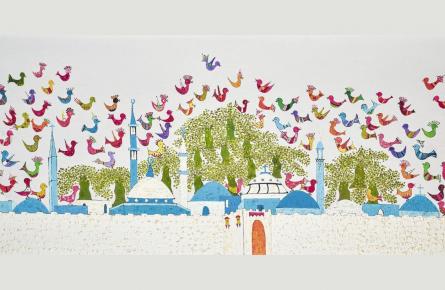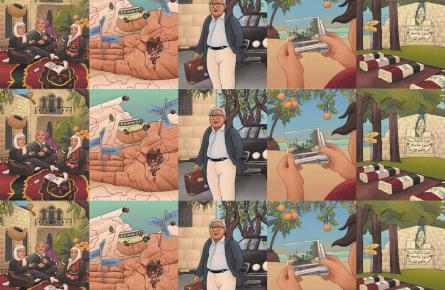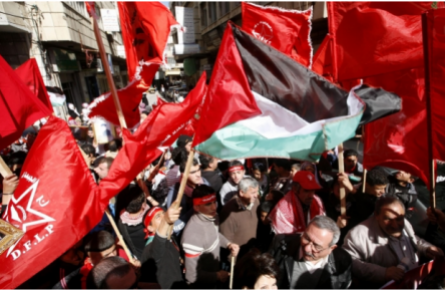In 2018, it was not safe for Palestinians to express political dissent online. A report released by 7amleh, a Palestinian digital rights advocacy and training organization, examined the violation of digital rights and surveillance carried out by the Israeli government, the Palestinian Authority (PA), and Hamas against Palestinians. While the oppression of Palestinian speech is not a new phenomenon, 7amleh’s report highlights a dynamic that is often overlooked in analyses of the Palestinian predicament today; namely how Israeli violence against Palestinians is being reinforced by Palestinian ruling bodies that institute repression in order to consolidate their powers.
According to 7amleh’s report, online censorship in Palestine operated primarily through direct governmental action on the part of all three ruling regimes.
In
Israel, the State Attorney’s office has been operating a “cyber unit” since
2015, which is charged with confronting “cyberspace enforcement challenges.”
The unit monitors social media to “predict” which citizens are likely to become
suspects, and it often carries out arrests based on charges of “incitement to
violence” in online content. This charge was interpreted so broadly in 2018
that Palestinian poet Dareen Tatour was sentenced to a
five months prison term for posting a poem titled “Resist, my people resist
them.”
Although
Israeli cybersecurity law is meant to be applied equally to all citizens, 82
percent of incitement charges were brought against Palestinians citizens of
Israel, who only constitute about 22% of the population. Israeli Jews, on the
other hand, produced 474,250 social media posts threatening violence against
Palestinians, but were rarely met with repercussions. This blatant
discrimination is not an anomaly in Israel, but rather a fundamental and
long-established legal bias. According to Adalah, the Legal Center for Arab
Minority Rights in Israel, no less than 65
Israeli laws are designed to disproportionately harm Palestinian citizens of
Israel. Policing online content is a particularly virulent expression of this discriminatory
legal system, and it serves to uphold Israeli apartheid by silencing criticism
of any policy adopted by the government. In fact, the tactic has been so effective
that the Strategic Affairs Ministry as well as private Israeli firms have
replicated it internationally. They have invested over 100 million shekels in
online smear campaigns designed to discredit opponents of Israeli violence by
accusing them of hate speech and anti-Semitism. Israel thus legally
intimidates Palestinians while signaling that Israelis are victims of an anti-Semitic
international campaign.
Meanwhile, in the occupied West Bank, the stifling of online expression has cemented the role of the PA as a self-interested conduit of Israeli colonial rule. The Palestinian general prosecutor, the security forces, and the Ministry of Telecommunication have been granted special powers to monitor online civilian content and to block websites at will. They have used this power to detain the authors of political Facebook posts and to subject them to brutal interrogation and torture.
Arbitrary arrests like these have been implemented not just to police dissent against the Palestinian Authority itself, but also to restrict resistance against the Israeli occupation. At the heart of the PA’s campaigns to suppress online dissent is its security relationship with Israel, locally referred to as security coordination. PA officials have carved out a privileged position within occupied Palestine, and they have maintained it by positioning themselves as closely as possible to Israeli security infrastructure, even if this has come at the expense of resistance to the occupation. Many West Bank Palestinians who are detained by the PA will often be released, only to find themselves in the hands of Israeli authorities, faced with nearly identical charges. In 2017, this coordination led to the murder of activist Basel al-Araj by Israeli forces following his release from detention in a PA prison.
The
situation in the Gaza Strip, where Hamas is the de facto government, is no less
precarious. Hamas’ regime has continuously repressed dissenting Palestinian
expression. Throughout 2018 in Gaza, Hamas applied a 1963 law to criminalize
any online dialogue that was critical of the group’s policies. Among those
detained last year were a 66-years old writer and former Hamas member, as well
as a 60-year old professor. Both were arrested for Facebook posts that criticized
Hamas.
Hamas’ crackdown on online dissent fits into a broader matrix of oppressive practices that the organization has weaponized against the besieged population in Gaza. Last year, Human Rights Watch found that Hamas engages in systematic torture and arbitrary detention. These violations have only increased this year in response to protests against new taxes. According to the Independent Commission for Human Rights, a Palestinian watchdog organization, more than 1,000 protestors have been arrested in Gaza since March 14, and many have been brutally beaten.
[Special Focus | Hamas at Crossroads]
This
violent response to peaceful objections against an unlivable status quo
reflects a growing gap between Hamas’ leadership and Palestinians in Gaza.
Although the most recent opinion polls indicate that support for the Islamic
group is slightly greater than pro-Fatah sentiment,
the Palestinian position between a rock and a hard place should not be
interpreted as strong favor for a repressive government. In fact, most of the
support for Hamas is derived from the fact that 43 percent of respondents
blamed the Palestinian Authority in the West Bank for worsening conditions in
Gaza. These dynamics represent a harsh reality for Palestinians: both governing
bodies meant to speak for their interests prioritize the maintenance of their
own positions above the promotion of healthy and democratic criticism and
ensuring that the needs of the people are met.
This
conclusion, although jarring, cannot be adequately interpreted outside its
proper context. Underlying repression by both the PA and Hamas are a set of
conditions that are imposed unilaterally by Israel. The PA functions to protect
Israel’s occupation and colonization project, and its anti-democratic measures
are approved and promoted by the Israeli government. Hamas cannot possibly take
all the steps necessary to suppress protesters who are demanding better living
conditions so long as the Israeli-imposed land, sea, and air blockade prevents
any economic development. As the governing authority in the world’s largest
open-air prison, Hamas deserves severe criticism for its heavy-handed
repression. Still, the only body with the power to liberate those in that
prison is the Israeli government, which has elected to silence Palestinian
critics of its policies instead of taking any meaningful action to achieve
peace.




